Activity Level: Above Average
Hypoallergenic: No
Social Ability: Friendly
Skills: Companionship, Vigilance, Loyalty
Intelligence: Average
Ideal Climate: Cool to Temperate
A small canine with a huge personality, the Chihuahua has been a beloved dog breed in North and Central America for decades. Their willful demeanors and affectionate personalities make them fantastic companions, and their graceful gait makes them outstanding show dogs as well.
Breed Overview
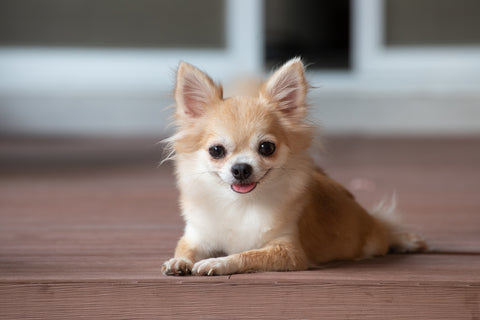 Origin: In order to understand the incredible history of the Chihuahua, we must first go back thousands of years to when their ancestors roamed northeastern Europe. Recent DNA research suggests that native American canines entered the North American region from Siberia about ten-thousand years ago. They and their unique genetic signatures were isolated to the wilderness until European colonizers arrived nearly nine-thousand years later; this era also saw the American ecosystem adapt to numerous new animals including pigs, goats, and sheep. A 2020 study on sequencing canine genomes suggests that pre-colonial ancestral genetics survive in two Mexican dog breeds, the Xoloitzcuintli and the Chihuahua. In other words, the Chihuahua is a living fossil of ancient canine DNA.
Origin: In order to understand the incredible history of the Chihuahua, we must first go back thousands of years to when their ancestors roamed northeastern Europe. Recent DNA research suggests that native American canines entered the North American region from Siberia about ten-thousand years ago. They and their unique genetic signatures were isolated to the wilderness until European colonizers arrived nearly nine-thousand years later; this era also saw the American ecosystem adapt to numerous new animals including pigs, goats, and sheep. A 2020 study on sequencing canine genomes suggests that pre-colonial ancestral genetics survive in two Mexican dog breeds, the Xoloitzcuintli and the Chihuahua. In other words, the Chihuahua is a living fossil of ancient canine DNA.
The story of the Chihuahua begins in the sixteenth century when they were recognized as a unique type of small dog. Conquistadores discovered packs of these dogs in the Mexican region that would later be called Chihuahua, hence their name. They were wild, but some sources suggest that they were always friendly towards humans, if a bit aloof. For this reason, these dogs were rarely adopted as companions or trained as workers until the twentieth century when they were tasked with catching rodents around homesteads. By this time, Chihuahuas were becoming as commonplace as any other dog breed all over Mexico, and their popularity would continue to grow over the coming decades.
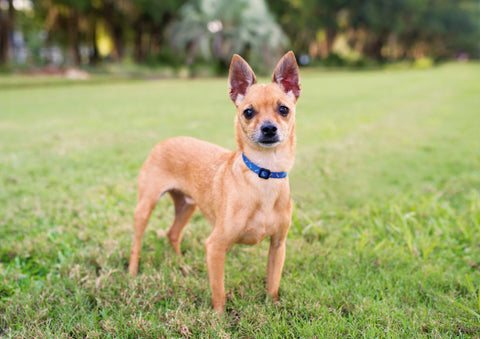 History: In the 1900s, continued growth and development across the world caused an increased need for farming, agriculture, and war efforts. Thus, people and organizations tended towards larger breed dogs who could herd cattle, guard livestock, and pull carts in order to pull their weight among the rank and file. Because Chihuahuas are so small, they were deemed a luxury and were overlooked for decades as other breeds skyrocketed into popularity. As the 1960s rolled around and major war fallout was dwindling, luxury dogs became increasingly common among the upper classes. Chihuahuas joined other toy breeds in lap dog comfort, where they lived happy and well-fed lives as companions. Today, Chihuahuas remain a popular dog breed in North America, Central America, and Europe.
History: In the 1900s, continued growth and development across the world caused an increased need for farming, agriculture, and war efforts. Thus, people and organizations tended towards larger breed dogs who could herd cattle, guard livestock, and pull carts in order to pull their weight among the rank and file. Because Chihuahuas are so small, they were deemed a luxury and were overlooked for decades as other breeds skyrocketed into popularity. As the 1960s rolled around and major war fallout was dwindling, luxury dogs became increasingly common among the upper classes. Chihuahuas joined other toy breeds in lap dog comfort, where they lived happy and well-fed lives as companions. Today, Chihuahuas remain a popular dog breed in North America, Central America, and Europe.
Currently, there are two recognized types of Chihuahuas, deer head and apple head, named as such for their distinctive head shapes. Deer head Chihuahuas are rarer for two simple reasons; they are not recognized by the AKC, and therefore they are bred less often and harder to find. Apple head Chihuahuas are known to have a more willful personality, which is explained in further detail below.
Breed Attributes
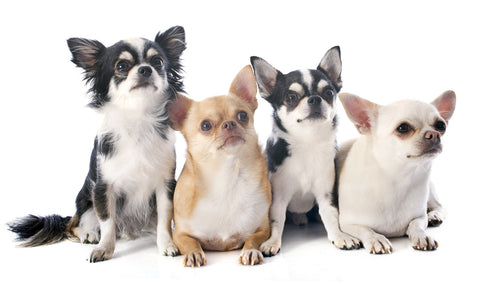 Temperament: A Chihuahua’s temperament is often described with the same few words: lively, energetic, and sassy. Luckily, their attitude does not often stray into the realm of stubbornness; rather, they are easy to train and respond well to positive reinforcement training. Though they are small, these canines can fulfill tasks such as retrieving, signaling, and vigilance, though it is not recommended to give a guarding task to a friendly, pocket-sized Chihuahua. Instead, their highly aware and astute nature helps them help you in the small ways that they can.
Temperament: A Chihuahua’s temperament is often described with the same few words: lively, energetic, and sassy. Luckily, their attitude does not often stray into the realm of stubbornness; rather, they are easy to train and respond well to positive reinforcement training. Though they are small, these canines can fulfill tasks such as retrieving, signaling, and vigilance, though it is not recommended to give a guarding task to a friendly, pocket-sized Chihuahua. Instead, their highly aware and astute nature helps them help you in the small ways that they can.
Chihuahuas are one of the smallest canine breeds, so they are susceptible to Small Dog Syndrome. While this may sound medical and scary, it is a simple term used to describe instances in which small dogs get away with behaviors larger dogs do not, such as jumping up on humans’ legs. It may seem insignificant, but allowing your dog to exhibit dominant behavior can lead to more of the same, including jealousy, entitlement, and aggression. Be sure to train your dog as early as you can and socialize them with other trained dogs to encourage good behavior.
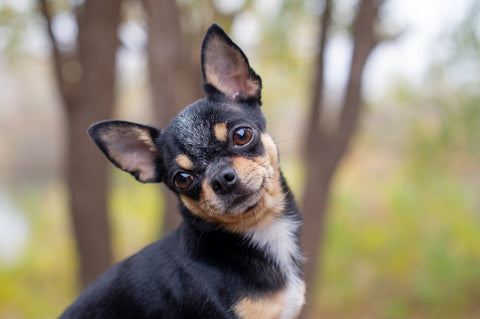 Personality: Every dog has different personality traits, but you can count on a Chihuahua to be loyal, affectionate, and confident. These dogs typically stick close to their owner or their pack, where they feel comfortable and supported. Small dogs often have strong pack instincts because of their need for protection and backup in the wild.
Personality: Every dog has different personality traits, but you can count on a Chihuahua to be loyal, affectionate, and confident. These dogs typically stick close to their owner or their pack, where they feel comfortable and supported. Small dogs often have strong pack instincts because of their need for protection and backup in the wild.
Chihuahuas are known to be very vocal as barking is their main means of communicating with their animal companions and with you, even if you don’t understand them. This behavior should not be punished, but obedience training can help your dog know when and when not to bark.
Ideal Owner: You! Chihuahuas are outstanding companions who will keep you on your toes and keep you company all day every day. This breed has been beloved for decades, and their popularity is well-deserved. Their loyalty and affection won’t go unnoticed as they keep you company every day.
Fur Care
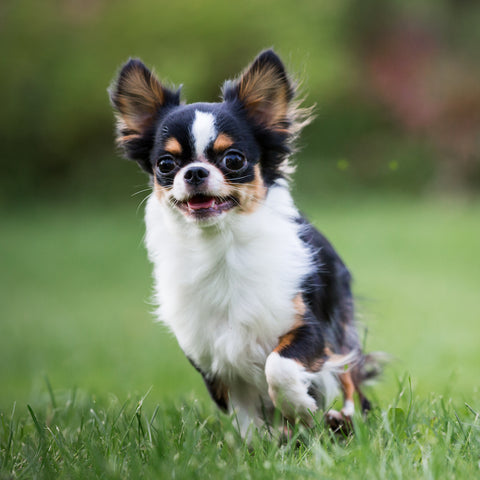 Grooming: A Chihuahua’s coat is typically short and smooth, with some variation in coat length. Even long-haired Chihuahuas’ coats are easy to groom with a bristled brush, which may only be necessary on a weekly basis. Brushing the coat is a great way to support dermatological health, as it stimulates blood flow and helps remove dead skin and loose fur.
Grooming: A Chihuahua’s coat is typically short and smooth, with some variation in coat length. Even long-haired Chihuahuas’ coats are easy to groom with a bristled brush, which may only be necessary on a weekly basis. Brushing the coat is a great way to support dermatological health, as it stimulates blood flow and helps remove dead skin and loose fur.
To keep their coat soft and clean, a nourishing oatmeal shampoo is a great option, as it cleans the skin and moisturizes the fur all at once. Dogs who go outdoors often can accumulate odors in their coat, even if their fur is short. Our Chihuahua Deodorizing Shampoo is great for long haired Chihuahua puppies as it gently eliminates odors at the source.
Shedding: Because Chihuahuas shed, they are not considered to be hypoallergenic. Their short fur typically sheds less than the average dog, and shedding can be managed with a few important factors. Their nutritional intake can contribute to fur health; insufficient omega 3 fatty acids in their diet may lead to excessive shedding, as omegas are essential to maintaining skin hydration and dermatological health. As well, regular brushing helps increase blood flow to the skin, which can help maintain fur strength.
Colors: Tan, Black, Red, Golden, Brown, Chocolate, Blue, Silver, and White
More to Know: Chihuahuas are the smallest dog breed in the world, with a full-grown weighing as little as 2 pounds.
Health
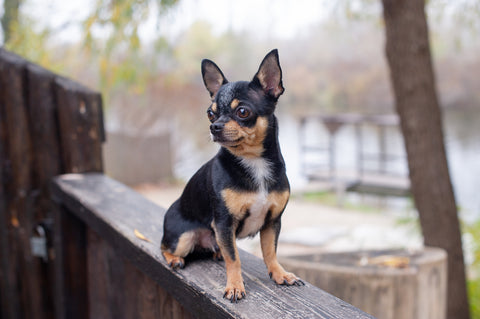 Common Issues: Thanks to responsible breeding practices and genetic diversity, Chihuahuas are relatively healthy canines. They are predisposed to a few health conditions that owners should be aware of, and your veterinarian can give you an accurate outlook for your pet’s wellness.
Common Issues: Thanks to responsible breeding practices and genetic diversity, Chihuahuas are relatively healthy canines. They are predisposed to a few health conditions that owners should be aware of, and your veterinarian can give you an accurate outlook for your pet’s wellness.
Chihuahuas are susceptible to several neurological conditions, including congenital deafness, muscular dystrophy, and ceroid lipofuscinosis. Regular veterinarian visits are essential to catch early warning signs of these diseases. As well, these small canines may develop a joint condition called patellar luxation, and their risk only increases with age. Veterinarians recommend a joint support supplement for Chihuahuas to provide nutritional support to the joints. Ingredients such as Glucosamine and Chondroitin are key to maintaining healthy joint tissues.
Chihuahuas are very small and therefore are sensitive to cold. In the colder months and especially in the snow, be sure to bundle up your pup with a vest, jacket, or boots and limit time outside.
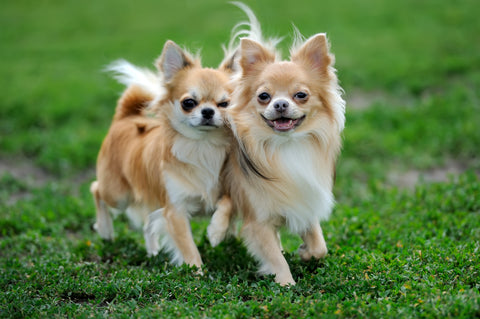 Nutrition: Small dogs need plenty of protein just like their large peers, and that protein can come from numerous sources. Their food should be based in meats such as poultry or beef. Veterinary nutritionists recommend supplementing a healthy diet with a canine multivitamin for a boost of essential vitamins, minerals, and antioxidants that they won’t get from standard dog food.
Nutrition: Small dogs need plenty of protein just like their large peers, and that protein can come from numerous sources. Their food should be based in meats such as poultry or beef. Veterinary nutritionists recommend supplementing a healthy diet with a canine multivitamin for a boost of essential vitamins, minerals, and antioxidants that they won’t get from standard dog food.
It can be easier to overfeed a small dog than a large dog, as they need fewer calories in a day. Therefore, Chihuahua owners must be mindful of treats given to their dog, and their diet should never include table scraps. Food not intended for dogs can cause digestive upset and unbalance their gut microbiome. To support digestion and help relieve symptoms such as diarrhea and gas, try our Probiotic and Digestive Support for Chihuahuas.
Lifespan: 14-16years
Physical Activity
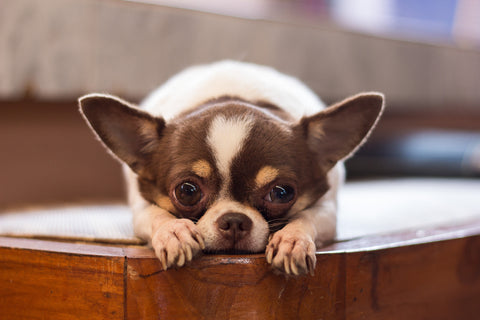 Training: A confident Chihuahua must be trained to keep their attitude in line. While their sassy personality can be fun, training a small dog is incredibly important because of their proclivity for the aforementioned Small Dog Syndrome. This issue involves a small canine getting away with behaviors larger dogs do not, such as jumping on laps or on furniture to assert their dominance. Efforts to avoid this include training and socialization to show them who the leader is.
Training: A confident Chihuahua must be trained to keep their attitude in line. While their sassy personality can be fun, training a small dog is incredibly important because of their proclivity for the aforementioned Small Dog Syndrome. This issue involves a small canine getting away with behaviors larger dogs do not, such as jumping on laps or on furniture to assert their dominance. Efforts to avoid this include training and socialization to show them who the leader is.
Reward-based training is a popular method as most dogs respond well to it. However, be sure to monitor your Chihuahua’s treat consumption; these small dogs have very low caloric requirements every day and should not be fed more than their daily amount.
Exercise: A common myth about small dogs is that they do not need as much exercise because they walk around the house all day. However, they need just as much outdoor time and walking time as every other dog. Walking, hiking, and playing outdoors satisfies a dog’s instinctual need for migration. The smells, sights, and sounds of the outside world enrich a house pet's experience and comfort in their environment. Taking a Chihuahua out on a walk might just be the best part of their day. To ensure their safety, invest in an anti-predator vest or a harness.
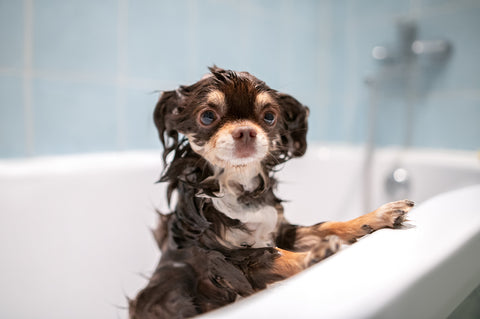 Their instinct to play is strong, but their drive to run is not quite as strong. Their large, muscular bodies are built for strength, but not necessarily speed or agility. Your Bernese will more likely enjoy a brisk walk outside with you than running circles in the backyard, but your dog will show you what they like. Listen to their body language and make sure they have access to space and toys.
Their instinct to play is strong, but their drive to run is not quite as strong. Their large, muscular bodies are built for strength, but not necessarily speed or agility. Your Bernese will more likely enjoy a brisk walk outside with you than running circles in the backyard, but your dog will show you what they like. Listen to their body language and make sure they have access to space and toys.
Safety: Chihuahuas, being the smallest canines on the planet, need special care taken when it comes to their physical safety. When taking your Chihuahua to a dog park or doggy daycare, remember the size difference between your 2-pound dog versus a 100-pound Mastiff. Not only could that situation be anxiety-inducing for your dog, their safety becomes a concern because they cannot defend themselves in the face of rough play or fighting. A great option is small-dog specific facilities where your dog can interact and play with others their own size.
When walking outside with your Chihuahua, even in cities or away from wooded areas, all small dogs should be wearing anti-predator gear. A spiked vest is a great option as it keeps numerous predators away and is generally comfortable for your pet

Chihuahuas are one of the most popular toy breeds in the world, and their likeness is iconic among famous canines. They are beloved for their loyal nature and adorable small sizes.

